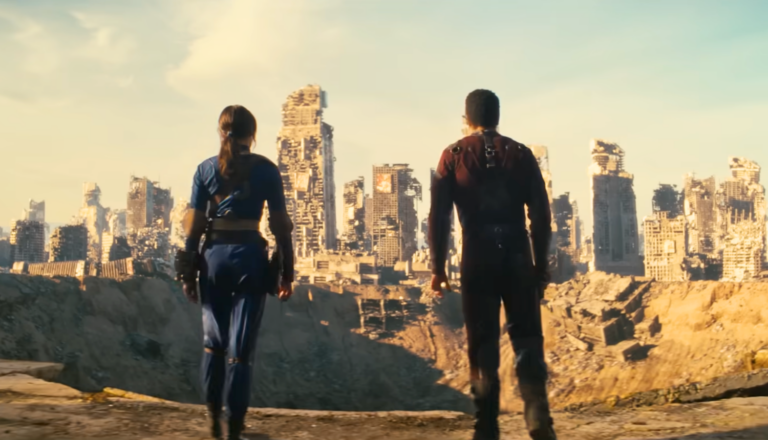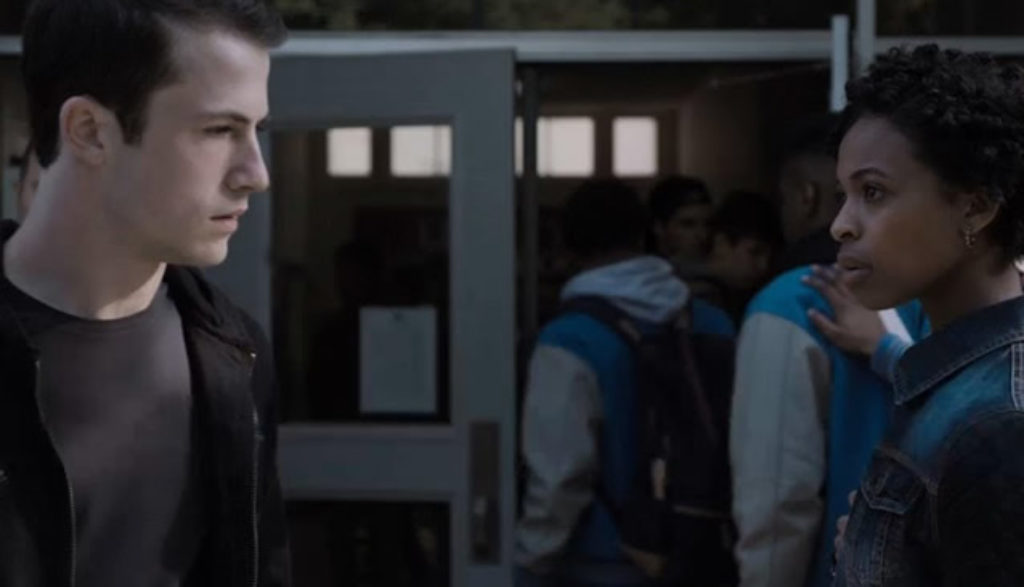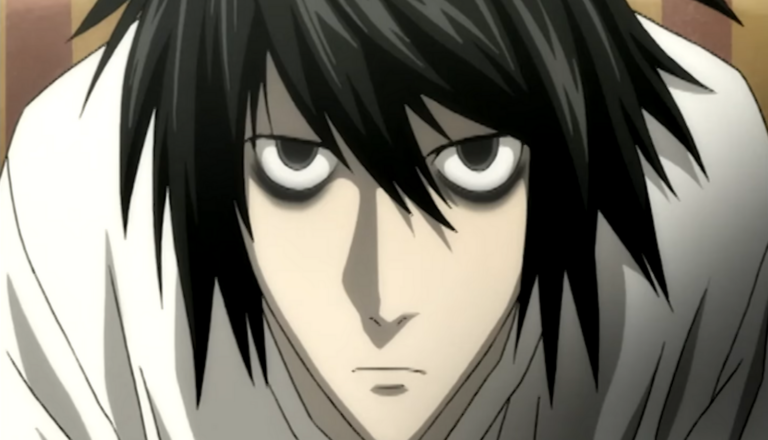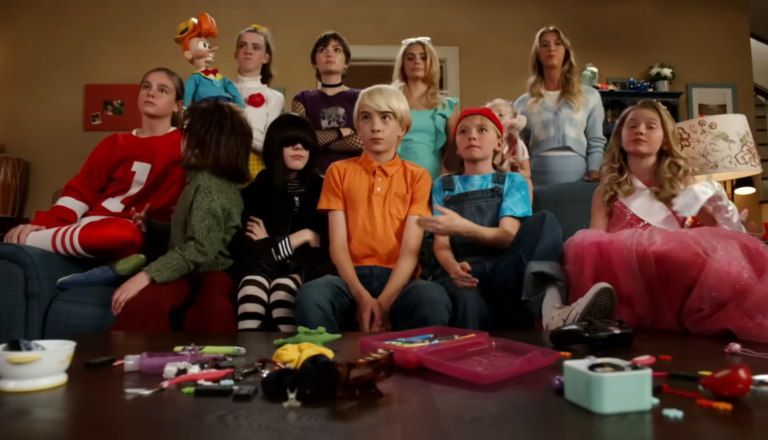
Fallout
A faithful rendition of the popular videogame, Prime Video’s Fallout is also just as bloody and problematic, too.

For two seasons, Bryce Walker has served as 13 Reasons Why’s official Worst Person in the World. Now he’s dead—murdered, in fact. And someone is responsible. But who could it be?
Zach, Bryce’s one-time bestie whom suffered a season-and-perhaps-career-ending injury at the hands of his now crosstown nemesis? Could it be Tyler, the disturbed yearbook photographer who nearly gunned down half the student body in Season 2? Or Casey, the politically active dynamo who might’ve hated Bryce less for who he was than what he represented?
Or could it maybe, possibly, conceivably be Clay, the show’s brooding anchor who sent a text to Bryce that read “I want you dead”?
With Hercule Poirot out on the Orient Express or something, it’s up to the students themselves (apparently) to solve this nefarious murder. New kid Ani knows all the secrets, and she plans to let them spill bit-by-bit, episode by episode. If anyone still cares, that is.
13 Reasons Why’s transformation from controversial teen touchstone to melodramatic whodunit took three seasons.
The first season (based on Jay Asher’s bestselling book, Thirteen Reasons Why) centered on the suicide of Hannah Baker and the cassette tapes she left behind—tapes in which she blamed a host of folks for her untimely demise. The show quickly drew in scads of viewers and even more controversy. Mental health experts said Hannah’s accusatory cassettes fed an unhealthy suicidal fantasy: “You made me do this!” the show suggested. And then we must mention the suicide itself—showed in graphic and painstaking detail. Asher’s book never described Hannah’s suicide in such specificity, in part because Asher presumably knew it might serve as a sort of twisted inspiration. If only Netflix had been so wise. Critics alleged that the scene amounted to a suicide tutorial and, after some real-world suicides were connected with the show, Netflix finally edited the scene out … more than two years after it first aired.
The second season—which Netflix now peppered with trigger warnings and offers of mental-health resources—continued to explore the aftermath of Hannah’s death. But it turned its attention to other serious issues: A one-time cheerleader named Jessica grapples with the fact that Bryce raped her the previous season. Tyler, the photographer, is bullied mercilessly, and an act of horrific sodomy pushes him to nearly commit mass murder. Only some timely intervention by Clay and his friends prevents Tyler from shooting up a school dance.
Part of Season 3 takes place in the immediate aftermath of the near mass-shooting: Clay, Tony (a former student/current auto repair expert who’s in a relationship with another guy) and several other students conspire to keep Tyler’s actions a secret (in an effort to keep him out of jail). But most of the story unfolds eight months later—in the aftermath of a homecoming game gone terribly awry and Bryce’s unsettling disappearance/murder.
And Hannah Baker? She’s mostly forgotten now, other than the cycle of secrets she revealed and recriminations she helped set in motion.
13 Reasons Why continues to aim for topicality and controversy, though not necessarily in that order. Bryce may be dead, but his evil deeds still cast a pall over the season (though in flashback he’s shown on a bit more human terms than he enjoyed before). His former girlfriend, Chloe, aborts Bryce’s baby by the second episode. Steroid use, drug abuse, physical assaults and homosexual relations are all part of the stew, too—efforts to keep 13 Reasons Why on the front-burner of cultural conversation and, perhaps, in the headlines. The program is even introduced by most of its main actors, imploring people who are dealing with these issues to tread carefully.
“If these (themes) are issues in your life, this series may not be right for you,” Justin Prentice (Bryce) tells us. “Or you may not want to watch it alone,” someone else chimes in. “So watch with your parents, your family or your friends.” The stars of the show encourage viewers to talk about what they see on the show—and how they feel as a result.
That’s all good advice, as far as it goes. Like Justin, Plugged In would strongly caution anyone against watching this show. For those determined to view it anyway, we’d also recommend discussing the thing with others. You can’t let this stuff stew in your noggin without some catalyst to process it.
But the show’s introduction feels horrifically two-faced when juxtaposed against the story itself.
Consider, first, that 13 Reasons is rated TV-MA—presumably for both its topics and its mountain of problematic content. F-words are flung about like confetti. Violence (and its aftermath) is frequent and jarring. Sexual content, while not always as graphic as it could be, is a discomforting plot point in every episode. The MA rating itself means that no one under the age of 17 should be consuming show without parental guidance—which makes the introduction a tacit admission that this program’s intended viewership is, technically, too young to be viewing it.
And then there’s this: While again it’s great that 13 Reasons exhorts viewers to talk with parents or school counselors if the content bothers them, it also has spent three full seasons undercutting the authority of the same adult gatekeepers. Hannah’s biggest finger-point in Season 1 was reserved not for her rapist, but for the school counselor whom she deemed didn’t do enough to help her. Parents are shown as well-meaning but ineffectual. And every student here is just filled to the brim with secrets. They’ll tell ’em to each other, but to adults? Perish the thought.
The makers of 13 Reasons Why seem to want it both ways: To be a catalyst for mature conversation while mainstreaming extreme, explicit content and actions to its youthful audience. Forget reasons why to watch. That’s one big reason why not.

Ani finally tells the police who killed Bryce Walker. But much like the rest of the season, what she tells them isn’t exactly what happened.
Montgomery de la Cruz (Monty), who was arrested in a previous episode for physically and sexually assaulting another male student, is visited by his father in prison. His dad asks him if it’s true that his son is a “f-ggot,” and spits on him when Monty says yes. In a flashback, Monty has consensual sex with another one of his male classmates (we see the motions and both participants shirtless, but nothing is seen from the waist down). Another male character’s boyfriend touches him on the arm and leg romantically. A heterosexual high school couple kisses and then cuddles on a bed (fully clothed, over the covers). The student who was assaulted by Monty reveals a series of shirtless pictures showing the cuts and bruises left on his body from the assault and his progress as he healed from both the physical and mental wounds.
Multiple students lie to the police about what happened with Bryce and Monty. After Monty is killed in prison, they and a police officer also tamper with evidence to exonerate the guilty party. A young man’s suicide attempt is discussed briefly. We see a drug deal go down in shadows. A student mentions being drunk. The f-word is used at least 30 times, and Jessica and Alex say “FML.” “A–,” “d–n,” “s—,” “d–k,” “a–hole,” and “h—” are also used several times. God is misused once and Jesus is misused another three times. A family prays at Thanksgiving dinner, while at another home two homosexual students joke about not being Catholic or Baptists anymore. Ani’s mom wears a cross necklace.
[Spoiler warning] After Zach beat up Bryce (seen in a previous episode), Bryce was unable to walk. Bloodied and broken, he is found by Jessica and Alex. A cassette tape that he gives to Jessica contains his confession to raping her, Hannah Baker, and seven or eight other girls. Rather than leave Bryce by the river to freeze to death, Alex tries to help him. But when Bryce, in pain, begins cursing and threatening to ruin Zach’s life, Alex pushes Bryce into the river and he drowns as Alex and Jessica watch from the pier.
Ani continues to share what she knows about Clay, Bryce, and the rest of Liberty’s students with the police.
Ani reveals that in the months preceding his death, Bryce accidentally got his girlfriend, Chloe, pregnant. We see Chloe’s predicament play out on screen. Reluctant to tell Bryce, Chloe shares the news with Zach Dempsey, Bryce’s friend, and Zach supports her as she contemplates her future, even offering to pretend the child is his. Chloe seeks help at a pregnancy resource center, but after a conversation with Bryce’s mom about Bryce’s cruelty, she decides to have an abortion—a decision she clearly battles with. At the abortion clinic, she is escorted past protestors only to find out that her “escort” is another protestor.
The woman shoves the plastic replica of a fetus into Chloe’s hands. They beg her to pray with them and remind her that Jesus loves her and her baby as she cries and runs inside with Zach. Inside, she explains that the pregnancy was a result of not taking her birth control pills. The nurse then explains the abortion procedure in detail. Later, we see the procedure taking place (something she was able to do without parental consent, thanks to her state’s laws), but the camera focuses on Chloe’s face and hands as she holds back tears and clenches her fists. After the procedure, she is seen in a recovery room with several other women, looking catatonic. Months later, she admits to thinking about the baby every day, but can’t seem to decide if she feels more relieved or ashamed that the abortion ever happened.
A group of teen boys discuss their infidelities. Teenagers lightly discuss alcohol. In flashback, Bryce mentions how he had to quit drinking while on probation but that he also can’t give it up because of “genetics.” He is seen drinking out of a liquor bottle. His mother describes how his grandfather doesn’t like taking his medicine because it “clouds his mind.” A group of guys offer Bryce a “magic gummy,” but he claims he doesn’t partake. The f-word is used about 25 times, including one use of “m—–f—er and a few uses of “s—,” “bulls—,” “a–,” “d–k,” “b–ch,” “p-ss,” and “h—.” Not to mention two misuses each of God’s and Jesus’s names.
Teenage boys and girls are repeatedly bullied throughout the episode. A girl is heckled at a school assembly as she talks about her rape at the hands of Bryce. Another boy mockingly describes the sexual orientation of his classmate and how the same young man attempted to shoot himself in the head, but missed. The results of violence are seen on the faces and bodies of several male students sporting cuts, bruises, and even a broken leg. One boy pulls a knife on another and threatens to cut him open after witnessing him terrorizing another student. Another boy is shoved down the stairs, smashing his face in the process. Chloe is described as having Stockholm Syndrome when it came to Bryce. Bryce’s dead body is found in a river at the end of the episode with lacerations on his face.
Ani, the episode’s new girl, lives with her mother, a caregiver who’s been hired to take care of Bryce Walker’s dying grandfather. She quickly meets most of the show’s main players and—when the story jumps forward eight months to Bryce’s disappearance—she’s clearly made friends with pretty much all of them. She brags that she knows all the secrets, and she’ll tell us all about them … if we have another 12 episodes to spare.
What secrets does she spill here? Not many. We know that Bryce disappeared after a homecoming fracas at another school, and many suspect that the serial rapist may have been killed. We see that lots of people are mad at each other for unclear reasons.
Bryce seems to ogle Ani as she swims in a modest bathing suit. Tony, a former student, talks with his boyfriend as they worry about whether the police will uncover some shadowy secrets of theirs. There’s a joke about a nonexistent gay “sex tape” being leaked. Ani washes blood out of a shirt. Another girl eyes a cassette tape spattered with blood. A male student takes pictures of his bare torso a couple of times: Once his body is festooned with bruises. Later, it looks fine. (Several other students are shown with facial injuries, too, and one football player walks on crutches.) People talk about sexual assault and harassment, and one teen girl jokingly threatens to “cut” someone. We see still photos of a massive fight on a football field.
Many students lie pretty much all the time. Some speculate that Bryce just got drunk and “stayed drunk,” meaning he’ll likely turn up. Bryce’s mother drinks whiskey. Ani promises to go to church with her mother. Characters say the f-word nearly 30 times and the s-word about another 15. We also hear “a–,” “d—n” and “h—.” God’s name is misused twice, once with the word “d–n.” Jesus’ name is abused three times.
“Kids don’t kill kids, right?” Clay says. Unfortunately, Clay, with enough motive, that’s not necessarily true.
Clay and Ani speculate whether Jessica might’ve had enough motive to kill Bryce after she shows virtually no emotion after his death. Another likely suspect is her ex-boyfriend Justin, who allowed her to be raped by Bryce when they were dating. The truth, it turns out, is even more crazy than they originally imagined.
Slowly recovering from her rape, Jessica indicates that she has started to have consensual sex with her boyfriend, Alex (which is seen later with Alex shirtless and Jessica in a bra, the lower halves of their bodies covered up by blankets). However, after telling Ani that the sex is “awful,” Ani bluntly suggests masturbation as an alternative. The two teen girls are then seen returning from a store with bags of sex toys. Later that night, Jessica removes her clothing (at one point we see her in a bra) and cries, still uncomfortable with herself because of the rape. Next, we see her head (the rest of her body beneath the covers), as she uses one of the devices. She later describes the experience as empowering, but admits it felt unhealthy because of the person on her mind.
In a brief montage, two teenagers engage in sex. In one scene shot from the side, the girl is not wearing any clothes on her lower half. In a couple of others, the two engage in sadomasochism. (When the boy’s roommate returns unexpectedly, she hides and he feigns that he was masturbating.) Couples kiss and make out in school hallways. A teenager indicates that the scratches on his back are from “rough” sex. Condom wrappers litter several sex scenes. The student council objects to Powder Puff football because of the emphasis on girls in bikinis. A girl wears a midriff-baring top to school.
School shootings are mentioned. In flashback, Bryce receives several death threats from his former friends. A student (who last season nearly committed a mass shooting) confesses that he kept a gun that should’ve been confiscated. He is later seen examining pictures that were taken of Bryce right after Bryce was shot in the head (suggesting he might have been involved).
Several students lie. A student vomits after learning about Bryce’s death. Bryce drinks alcohol in two scenes. He is also very disrespectful to his mom. A girl accuses the administration of being more concerned with her profanity-filled speech than about the rapists and predators she was calling out. The f-word is used nearly 50 times, accompanied by “a–,” “a–hole,” “b–ch,” “bulls—,” “h—,” “p-ss,” “s—,” and at least five possible misuses each of Jesus and God’s names (including one pairing with “d–n”).
“Well, of course you know Justin Foley is a drug addict?” Ani asks the police as they continue hunting for Bryce’s killer. Justin certainly seems suspicious. He claims he hadn’t seen Bryce for months before the homecoming game, but somehow, he got a hold of Bryce’s recently prescribed Oxycodone pills. Clay wants to believe Justin’s story that he found the pills at Bryce’s house during the funeral, but Justin also claimed he was clean, which was a lie. As Ani says, “Life with an addict means you never know what to believe. You’re always waiting for the next bad news.”
Justin started using drugs again after Seth, his mom’s abusive ex-boyfriend, threatened him with a gun and forced him to sell them to pay off an old debt. (We see the two exchange drugs and money.) Seth later catches Justin smoking heroin, and Seth points a gun to Justin’s head and demands $2,000 to pay for the remaining debt and the drugs he stole. After Justin admits to Bryce that he has been shooting heroin, not just smoking it, Bryce gives him a bottle of Oxycodone to help Justin wean himself off.
Justin’s friends attempt to protect him and get him clean throughout the episode, sometimes using unsavory means to do so. Zach even goes as far as switching Justin’s urine sample after a random drug test. Clay catches Justin snorting drugslines in the bathroom but winds up giving Justin back the bottle of Oxy when he realizes that he isn’t equipped to help Justin quit.
A high school couple makes out in the school hallway. Justin is seen shirtless in a few scenes. A man calls a woman a “whore” to her son. A football coach harshly confronts Justin about his drug use and calls him “white trash.” Justin is called a “junkie” several times. The f-word is used more than 65 times. Other frequent curse words include “s—,” “p–s,” “d–k,” “a–,” “h—,” “a–hole,” and “d–mit.” Christ’s name is taken in vain at least four times as well.



Paul Asay has been part of the Plugged In staff since 2007, watching and reviewing roughly 15 quintillion movies and television shows. He’s written for a number of other publications, too, including Time, The Washington Post and Christianity Today. The author of several books, Paul loves to find spirituality in unexpected places, including popular entertainment, and he loves all things superhero. His vices include James Bond films, Mountain Dew and terrible B-grade movies. He’s married, has two children and a neurotic dog, runs marathons on occasion and hopes to someday own his own tuxedo. Feel free to follow him on Twitter @AsayPaul.

Emily studied film and writing when she was in college. And when she isn’t being way too competitive while playing board games, she enjoys food, sleep, and geeking out with her husband indulging in their “nerdoms,” which is the collective fan cultures of everything they love, such as Star Wars, Star Trek, Stargate and Lord of the Rings.

A faithful rendition of the popular videogame, Prime Video’s Fallout is also just as bloody and problematic, too.

Death Note explores religion, morality and justice as its main character seeks to become the “god of a new world.”

The Really Loud House takes all the positives and negatives of its predecessor and turns them live action.

The mutants are back in Disney’s retro iteration of the X-Men—as are the violence and superhuman abilities that typically accompany this franchise.